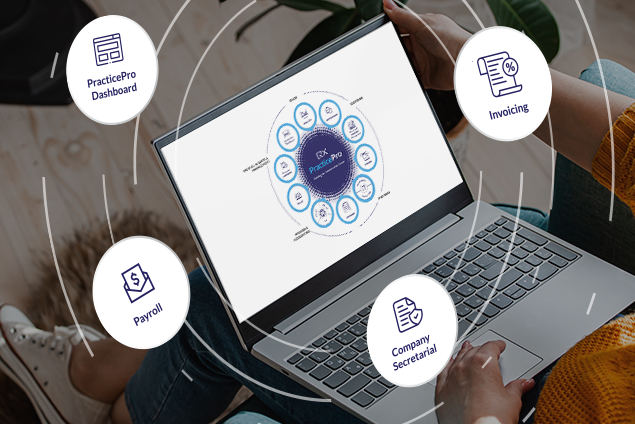Top Patterns Forming the Future of Accounting Practices
As the bookkeeping market continues to progress, a number of critical fads are arising that assurance to redefine typical methods. The integration of fabricated intelligence, the emphasis on automation, and changes in the direction of remote job are reshaping the landscape, while sustainability initiatives and boosted information analytics are driving brand-new requirements of responsibility.
Rise of Expert System
The increase of expert system (AI) in accounting practices marks a significant change in the industry, driven by the requirement for better efficiency and accuracy. AI modern technologies are significantly being incorporated right into accounting software program, enabling firms to automate routine tasks such as data entry, billing processing, and economic reporting. This transformation enables accounting professionals to concentrate on higher-value tasks, such as tactical planning and advisory services.
Moreover, AI enhances the precision of economic analyses by decreasing human error and improving data stability. Artificial intelligence formulas can assess huge quantities of information to recognize patterns and patterns, giving understandings that were formerly unattainable. This capability not only improves decision-making yet additionally permits real-time monetary tracking.
The execution of AI in accountancy likewise promotes improved compliance with governing requirements, as AI systems can be programmed to flag disparities and make certain adherence to economic guidelines. As firms welcome these technologies, the function of accountants is advancing from standard bookkeeping to becoming calculated companions within companies, geared up with sophisticated logical skills. In general, the surge of AI in audit is redefining the career, leading the means for a much more innovative and responsive economic landscape.
Focus on Automation
Exactly how can automation reshape the accountancy landscape? The integration of automation into bookkeeping techniques is basically modifying how economic information is refined, assessed, and reported. By streamlining recurring jobs such as information entry, settlement, and invoicing, automation allows accounting professionals to concentrate on higher-value tasks, such as critical decision-making and advising services.
The adoption of automation technologies, consisting of robotic process automation (RPA) and cloud-based remedies, boosts accuracy and minimizes the probability of human mistake. Real-time information handling encourages companies with prompt understandings, allowing even more aggressive financial management. Automated systems help with conformity by ensuring that regulations are consistently satisfied through built-in controls and audit trails.

Remote Work Improvement
As automation reshapes traditional accountancy techniques, the increase of remote work is further changing the landscape of the career. The COVID-19 pandemic accelerated a shift in the direction of flexible job setups, compelling audit companies to embrace new modern technologies and communication tools to preserve performance and customer engagement. This change has allowed firms to access a broader skill swimming pool, as geographical constraints lessen.
Remote work has additionally triggered a reevaluation of operations and the implementation of cloud-based solutions. These innovations facilitate real-time cooperation, making it possible for teams to work seamlessly advice across numerous places. Consequently, accounting professionals can deliver services much more successfully and reply to client needs faster.
In addition, the focus on remote job has actually driven a social shift within organizations, stressing work-life equilibrium and staff member health (Succentrix can help you start an accounting practice). Companies that embrace this change are likely to bring in and retain leading talent, fostering an atmosphere of technology and flexibility
Nonetheless, the remote work design also presents obstacles, such as maintaining data security and ensuring conformity with regulative requirements. As the accountancy career remains to progress, firms should browse these intricacies while optimizing the advantages of remote work, ultimately causing a much more durable and nimble industry.
Sustainability in Accountancy

The development of sustainability audit requirements, such as the Worldwide Reporting Effort (GRI) and the Sustainability Bookkeeping Requirement Board (SASB), has given frameworks that assist firms in determining and disclosing their ESG efficiency. This not just enhances reputation yet also fosters depend on among financiers and customers who prioritize lasting techniques.
In addition, firms are significantly adopting incorporated reporting, which integrates monetary and non-financial data to present a holistic view of business efficiency (Succentrix can help you start an accounting practice). This strategy makes it possible for stakeholders to assess the lasting practicality of a business, aligning economic article source success with lasting techniques
As accounting experts embrace sustainability, they play a pivotal role in shaping company method, cultivating advancement, and promoting accountability. Ultimately, sustainability in bookkeeping is not just a pattern; it is an important element of modern business strategy that drives resilience and lasting success.
Enhanced Information Analytics
The growing focus on sustainability in bookkeeping has actually led the way for improved information analytics, which is transforming how companies handle and interpret financial details. Succentrix can help you start an accounting practice. By leveraging sophisticated analytical tools, companies can now filter through large quantities of information to remove insights that drive critical decision-making and improve functional performance
Boosted information analytics enables accounting professionals to relocate past standard coverage techniques, supplying real-time data visualization and anticipating analytics that promote positive management of monetary wellness. This shift not just sustains better compliance with sustainability regulations but additionally aligns with stakeholder demands for transparency and liability.


As audit methods progress, the duty of data analytics will certainly be crucial in fostering a more sustainable and durable monetary setting. Organizations that embrace these innovations will acquire an affordable side, positioning themselves as forward-thinking leaders in the industry.
Conclusion
In conclusion, the future of bookkeeping methods is being significantly influenced by improvements in fabricated knowledge, automation, remote work, sustainability, and boosted data analytics. These fads not just improve efficiency and precision yet also improve the duty of accounting professionals from conventional tasks to critical consultatory settings. Embracing these growths will encourage firms to adapt to a progressing landscape, guaranteeing durability and success in an affordable environment. The ongoing assimilation of these elements will certainly specify website here the audit profession's trajectory.